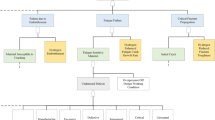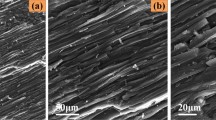Abstract
As part of the analysis of the possibility of using the Ukrainian gas transportation system for transporting blends of natural gas and hydrogen, the peculiarities of the influence of hydrogen degradation of pipe steel on the brittle strength of girth welds and local corrosion metal losses were considered. For this, they were used the methods of finite-element modeling of the stress–strain state of structures during welding and subsequent operation loading along with advanced criteria of macroscopic fracture of a body with a crack. The results of predicting the safety factor for a typical welded part of a main gas pipeline with postulated surface cracks during the transportation of gas-hydrogen blends of various compositions showed that the most susceptible to brittle fracture are the weld metal and heat-affected zone. But with regard to the fatigue strength of welded joints under the action of cyclic loading by internal pressure or bending moment, larger stress intensity factor ranges in the heat-affected zone cause a more significant reduction of the residual safety factors. Local corrosion damage during the transportation of gas-hydrogen blends had a considerable negative impact on pipeline reliability, particularly when material properties experienced hydrogen degradation and a decrease in fracture toughness. However, this effect could be mitigated by adjusting the operating load accordingly.








Similar content being viewed by others
References
Smiyan OD (2018) Gas emission and redistribution of hydrogen in aging of welded structures from different metallic materials. Paton Weld J 7:2–9
Sun Y, Cheng YF (2021) Hydrogen-induced degradation of high-strength steel pipeline welds: a critical review. Eng Fail Anal 133:105985
Vishnuvardhan S, Ramachandra Murthy A, Choudhary A (2023) A review on pipeline failures, defects in pipelines and their assessment and fatigue life prediction methods. Int J Press Vessels Pip 201:104853
Sharma SK, Maheshwari S (2017) A review on welding of high strength oil and gas pipeline steels. J Nat Gas Sci Eng 38:203–217
Dmytrakh I, Syrotyuk A, Leshchak R (2022) Specific mechanism of hydrogen influence on deformability and fracture of low-alloyed pipeline steel. Proc Struct Integr 36:298–305
Nykyforchyn H, Lunarska E, Tsyrulnyk OT, Nikiforov K, Genarro ME, Gabetta G (2010) Environmentally assisted “in-bulk” steel degradation of long term service gas trunkline. Eng Fail Anal 17(3):624–632
Stalheim D, Boggess T, SanMarchi C, Jansto S, Somerday B, Muralidharan G (2010) Microstructure and mechanical property performance of commercial grade API pipeline steels in high pressure gaseous hydrogen. In: Proceedings of IPC 2010 8th International Pipeline Conference Calgary, September 27–October 1, 2010 Calgary, Alberta, Canada
Akhonin SV, Milenin AS, Pikulin AN (2005) Simulation of evaporation processes of alloying elements during electron beam surface melting of ingots-slabs from titanium-base alloys. Problemy Spetsial’noj Electrometallugii 3:29–32
Milenin A, Velikoivanenko E, Rozynka G, Pivtorak N (2019) Residual strength and reliability of corroded pipelines—Monte-Carlo approach for consideration of spatially nonuniform material properties. Struct Integr 8:321–326
(2007) Fitness-For-Service. API 579–1/ASME FFS-1. Recommended practice 579. Second edition. American Petroleum Institute. Washington, API Publishing Services
Makhnenko V (2013) Problems of examination of modern critical welded structures. Paton Weld J 5:21–28
Velikoivanenko EA, Milenin AS, Popov AV, Sidoruk VA, Khimich AN (2019) Methods of numerical forecasting of the working performance of welded structures on computers of hybrid architecture. Cybern Syst Anal 1:117–127
Furrer DU, Semiatin SL (2009) ASM handbook. Volume 22A. Fundamentals of modeling for metals processing. Ohio, ASM International, xiv, p. 734
Meng B, Gu CH, Zhang L, Zhou CS, Li XY, Zhao YZ, Zheng JY, Chen XY, Han Y (2017) Hydrogen effects on X80 pipeline steel in high-pressure natural gas/hydrogen mixtures. Int J Hydrogen Energy 42(11):7404–7412
Smiyan OD (2018) Hydrogen and failure of the objects of long-term operation. Naukova dumka, Kyiv
(2008) DSTU-H B V.2.3–21:2008. Main pipelines. Guideline. Determination of the residual strength of main pipelines with defects. Кyiv, Minregionbud, III, p. 68
Acknowledgements
The authors of this work are grateful to the Ukrainian armed forces and the world community, which is now helping Ukraine in the struggle for freedom and independence. Thanks to the unity and unbroken spirit of the Ukrainian nation during this period of our history, it has been possible to carry out scientific researches for our peaceful and successful future.
Declarations
Author information
Authors and Affiliations
Corresponding author
Ethics declarations
Conflict of interest
The authors declare no competing interests.
Additional information
Publisher's Note
Springer Nature remains neutral with regard to jurisdictional claims in published maps and institutional affiliations.
Recommended for publication by Commission XI—Pressure Vessels, Boilers, and Pipelines
Rights and permissions
Springer Nature or its licensor (e.g. a society or other partner) holds exclusive rights to this article under a publishing agreement with the author(s) or other rightsholder(s); author self-archiving of the accepted manuscript version of this article is solely governed by the terms of such publishing agreement and applicable law.
About this article
Cite this article
Milenin, A., Velikoivanenko, E., Rozynka, G. et al. Numerical analysis of the brittle strength of welded pipelines with corrosion metal loss in the transportation of blends of natural gas with hydrogen. Weld World 67, 2803–2809 (2023). https://doi.org/10.1007/s40194-023-01612-5
Received:
Accepted:
Published:
Issue Date:
DOI: https://doi.org/10.1007/s40194-023-01612-5




